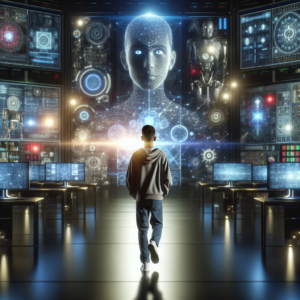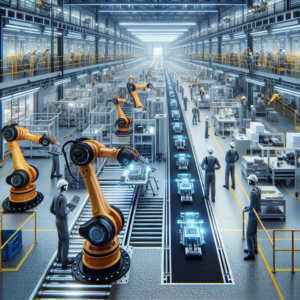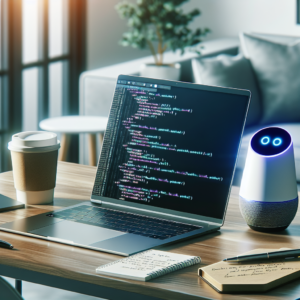AI Has Grown Beyond Human Knowledge, Says Google’s DeepMind Unit
Artificial Intelligence (AI) is one of the most talked-about technological advancements of our time. With the rapid pace of innovation, we are witnessing a shift in how AI systems are integrated into various aspects of our daily lives. Recently, Google’s DeepMind unit made headlines by asserting that AI has progressed beyond the current understanding of human knowledge. This bold claim raises crucial questions about the implications, opportunities, and challenges posed by this transformative technology.
Understanding DeepMind’s Assertion
DeepMind, a subsidiary of Alphabet Inc., is at the forefront of developing AI systems that have the potential to revolutionize industries. The assertion that AI has surpassed human knowledge suggests that AI has reached a level of sophistication where it can outperform humans in specific domains. Here are some key points to consider:
1. Definition of Knowledge in AI Context
To fully grasp the implications of DeepMind’s statement, it is essential to understand what is meant by “knowledge.” In the context of AI, knowledge refers to:
– Data processing capabilities
– Pattern recognition skills
– Ability to learn and adapt from vast datasets
– Decision-making processes that are informed by analyzing complex variables
AI systems have demonstrated a remarkable ability to analyze and interpret huge amounts of data, which often outstrips human capacity. This fact leads to a significant realization: AI is beginning to process and act on knowledge that was previously inaccessible or unmanageable for humans.
2. Advancements in AI Capabilities
DeepMind has made significant strides in various fields, showcasing the capabilities of AI:
– Healthcare: AI has shown remarkable potential in diagnosing diseases, analyzing medical images, and predicting patient outcomes. DeepMind’s algorithms have outperformed human specialists in specific tasks, leading to more accurate diagnoses and treatments.
– Gaming: The company’s AlphaGo program famously defeated world champion Go players, demonstrating the power of AI in strategic thinking and decision-making.
– Robotics: Advanced AI is being integrated into robotics, allowing machines to learn complex tasks through reinforcement learning.
These advancements not only illustrate the power of AI but also indicate the growing gap between human and machine capabilities.
The Implications of AI Surpassing Human Knowledge
As AI continues to evolve, it raises several implications for society, business, and ethical considerations.
1. Opportunities in Various Sectors
The ascendancy of AI presents numerous opportunities across different sectors. Businesses can leverage AI for:
– Enhanced Efficiency: Automated processes can lead to reduced operational costs and increased productivity.
– Data-Driven Decision Making: AI can analyze vast datasets to provide insights that help inform business strategies.
– Personalization: AI can tailor products and services to meet individual customer preferences, enhancing customer satisfaction.
2. Ethical Concerns and Challenges
With great power comes great responsibility, and the rise of AI also invites ethical challenges:
– Job Displacement: Automation may lead to significant job losses in various sectors, raising concerns about economic inequality and the future of work.
– Bias and Fairness: AI systems can inadvertently perpetuate existing biases in training data, leading to unfair outcomes in critical areas like hiring and law enforcement.
– Privacy: The use of personal data in AI models raises questions about consent and the protection of individuals’ privacy rights.
Preparing for an AI-Driven Future
As we stand on the brink of an AI-driven future, it is essential for society to prepare for the changes ahead. Here are some strategies that stakeholders can adopt:
1. Embrace Lifelong Learning
In a rapidly changing job market, continuous education and skills development will be vital. Workers need to adapt to new technologies by learning new skills, pursuing certifications, and engaging in lifelong learning.
2. Foster Collaboration Between Humans and AI
Rather than viewing AI solely as a threat, organizations should explore how to create synergistic relationships between humans and AI. This collaboration can enhance productivity and lead to better outcomes.
3. Establish Ethical Guidelines for AI Usage
Governments, organizations, and AI researchers must work together to create ethical guidelines governing AI development and deployment. These guidelines should prioritize fairness, accountability, and transparency in AI systems.
4. Promote Public Awareness and Dialogue
Educating the public about AI technologies and their implications is crucial. By fostering dialogue about the opportunities and challenges presented by AI, we can build a more informed society that is prepared to navigate the complexities of this new era.
Conclusion
The assertion by Google’s DeepMind unit that AI has exceeded human knowledge is both exciting and concerning. As we embrace the benefits of AI advancements, it is essential to remain vigilant about the ethical implications and potential societal challenges. By preparing for an AI-driven future through education, collaboration, and ethical guidelines, we can harness the transformative power of AI while ensuring that it serves humanity’s best interests.
As we move forward, the dialogue surrounding AI will continue to evolve, and it is crucial for all stakeholders—governments, businesses, and individuals—to participate in shaping a future where AI and humanity can coexist and thrive together. The journey ahead is filled with potential, and it is up to us to navigate it wisely.



